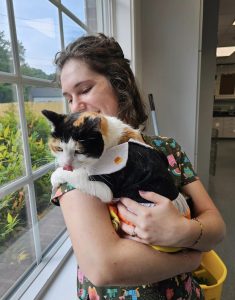Unleashing Relief: Introducing Two Revolutionary Medications for Osteoarthritis in Dogs and Cats
 Our older pets bring joy and warmth to our lives. However, as they age, they are susceptible to various health conditions, one of the most common being osteoarthritis (OA). Osteoarthritis is a painful degenerative joint disease that affects both dogs and cats, hindering their quality of life.
Our older pets bring joy and warmth to our lives. However, as they age, they are susceptible to various health conditions, one of the most common being osteoarthritis (OA). Osteoarthritis is a painful degenerative joint disease that affects both dogs and cats, hindering their quality of life.
Fortunately, recent breakthroughs in veterinary medicine have introduced two innovative injections, Librela™ (bedinvetmab injection) and Solensia ™ (frunevetmab injection), designed to alleviate the pain and discomfort associated with osteoarthritis. In this blog, we will explore the signs and symptoms of osteoarthritis in dogs and cats and how these cutting-edge treatments can provide much-needed relief.
What is Osteoarthritis?
Osteoarthritis is a chronic joint disease that leads to the deterioration of the cartilage that cushions the ends of bones in joints. This degeneration results in pain, inflammation, and a reduced range of motion. Osteoarthritis can affect any joint in a pet’s body, but it most commonly occurs in the hips, knees, elbows and shoulders. This disease can be caused by various factors, including genetics, aging, obesity, joint injuries and underlying medical conditions.
What Are the Signs of Osteoarthritis?
Recognizing the signs of osteoarthritis in your pets is crucial for early intervention and improving their quality of life. Since our pets are adept at concealing pain, you must be vigilant to see the signs of it. Here are some common signs and symptoms of osteoarthritis pain in dogs and cats:
Signs of Osteoarthritis In Dogs:
- Limping or Lameness: Dogs may favor one limb, exhibit a noticeable limp or show stiffness when they walk.
- Stiffness: Your dog may struggle to rise from a sitting or lying position and could be hesitant to climb stairs or jump onto furniture.
- Reduced Activity: Osteoarthritis often leads to decreased physical activity. Your dog may lose interest in playtime and walks.
- Muscle Atrophy: As your dog uses affected joints less, the muscles around those joints may start to waste away.
- Behavioral Changes: Pain may cause restlessness, irritability or even aggression in some dogs.
- Excessive Licking or Chewing: Dogs may lick or chew at painful joints in an attempt to alleviate their discomfort.
- Swelling and Heat: Affected joints may appear swollen and feel warm to the touch due to inflammation.
Signs of Osteoarthritis In Cats:
- Reduced Mobility: Cats with OA may move less, have difficulty jumping onto surfaces or struggle to reach grooming areas.
- Litter Box Issues: Cats may have difficulty getting in and out of the litter box, leading to accidents outside of it.
- Licking or Over-Grooming: Cats may excessively groom painful joints or areas.
- Loss of Appetite: Cats in pain may eat less, leading to weight loss.
- Personality Changes: Some cats become more reclusive or aggressive when dealing with chronic pain.
Do you suspect your cat may have OA? Here is a feline OA checklist.
 Introducing Librela ™ for Dogs.
Introducing Librela ™ for Dogs.
Librela™ is a groundbreaking medication designed specifically to manage pain and inflammation associated with osteoarthritis in dogs. What sets Librela™ apart is its ability to target a specific receptor involved in the pain and inflammation process, providing relief associated with osteoarthritis pain while protecting the human-animal bond and reducing caregiver burden.
The Key Benefits of Librela™:
With a convenient monthly injection, Librela™ effectively controls osteoarthritis pain, which can lead to an increase in your dog’s activity and quality of life. Librela™ is a monoclonal antibody that functions like your dog’s own naturally occurring antibodies. Unlike other medications, Librela™ has been shown to be easier on your dog’s liver and kidneys.
Although the effects of Librela™ may not be seen until after the second injection, some dogs will show a decrease in signs of osteoarthritis pain as soon as seven days after the first injection. Before considering Librela™, it’s always best to tell your veterinarian about any medications your dog is currently receiving. Librela™ has shown minimal adverse effects, making it suitable for long-term use.
 Solensia™: A Game-Changer for Cats
Solensia™: A Game-Changer for Cats
Managing osteoarthritis in cats has long been a challenge due to limited treatment options. However, recent advancements have created Solensia™, a groundbreaking medication specifically designed to alleviate the pain and discomfort associated with feline osteoarthritis.
Solensia™ is a monoclonal antibody therapy that targets and neutralizes a key mediator of pain and inflammation in cats with osteoarthritis. The introduction of Solensia™ is revolutionary for several reasons:
High Efficacy: Solensia™ has demonstrated remarkable efficacy in clinical trials, significantly improving cats’ mobility and quality of life.
Minimal Side Effects: Unlike some traditional pain medications that can have adverse effects on cats’ kidneys or liver, Solensia™ has proven to prevent these effects from occurring.
Long-Lasting Relief: A single injection of Solensia™ provides pain relief for up to 30 days in cats, eliminating the need for daily medication and making it a convenient option for both cats and their owners. We see the greatest benefit when used at a monthly cadence, and results are dependent on your cat’s individual needs.
A Comprehensive Approach to Pain Management.
While Librela™ and Solensia™ offer invaluable relief for pets suffering from osteoarthritis, it’s essential to adopt a holistic approach to managing this condition. Here are some additional strategies to consider:
Weight Management: Obesity exacerbates osteoarthritis symptoms. Consult with your veterinarian to create a weight management plan if necessary.
Physical Therapy: Physical therapy exercises and activities can help improve joint flexibility and strengthen muscles.
Dietary Supplements: Supplements like glucosamine and chondroitin may support joint health. Discuss their use with your veterinarian.
Environmental Modifications: Make your home more accessible for pets with limited mobility. Consider ramps, orthopedic bedding and litter box accommodations.
Regular Veterinary Checkups: Schedule regular checkups to monitor your pet’s condition and adjust their treatment plan as needed.
Consult your veterinarian about Librela™ and Solesia™.
Osteoarthritis can significantly impact the lives of pets, causing pain and discomfort that diminishes their quality of life. However, thanks to recent advancements in veterinary medicine, Librela™ and Solensia™ have emerged as powerful tools in the fight against this debilitating condition. These injections, when used in conjunction with a comprehensive approach to management, can help pets regain their mobility, reduce pain, and enjoy a happier and healthier life.
If you suspect that your pet may be suffering from osteoarthritis, consult with your veterinarian to explore the best treatment options available. Your pet deserves a pain-free life, and these groundbreaking medications can help make that a reality.
For more information, questions, or concerns, contact Animal Hospital of Lewisville!
Librela ISI: IMPORTANT SAFETY INFORMATION:
See Full Prescribing Information. For use in dogs only. Women who are pregnant, trying to conceive or breastfeeding should take extreme care to avoid self-injection. Hypersensitivity reactions, including anaphylaxis, could potentially occur with self-injection. LIBRELA™ should not be used in breeding, pregnant or lactating dogs. LIBRELA™ should not be administered to dogs with known hypersensitivity to bedinvetmab. The most common adverse events reported in a clinical study were urinary tract infections, bacterial skin infections and dermatitis.
Solensia ISI: IMPORTANT SAFETY INFORMATION:
See Full Prescribing Information. For us in cats only. Women who are pregnant, trying to conceive or breastfeeding should take extreme care to avoid self-injection. Hypersensitivity reactions, including anaphylaxis, could potentially occur with self-injection. SOLENSIA™ should not be used in breeding cats or in pregnant or lactating queens. SOLENSIA™ should not be administered to cats with known hypersensitivity to frunevetmab. The most common adverse events reported in a clinical study were vomiting, injection site pain, and diarrhea.
